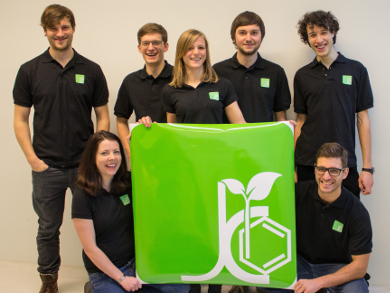The leading team of the Austrian Chemical Society’s (GÖCH) Young Chemists Division consists of seven former student council members from the University of Innsbruck: Simon Albertini, Emanuel Ehmki, Stefan Felderer, Simon Hofer, Veronika Huber (chairwoman), Elisabeth Mairhofer, and Martin Wieser. The team started its work in 2013, and aims to build a larger network covering other Austrian universities, as well as represent the interests of young chemists towards GÖCH, the chemical industry, and the public.
Simon Hofer
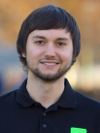
At the time we started to study chemistry in Innsbruck, we, the “Jungchemiker” (young chemists), were still clueless about what to expect at university. As a bunch of newly found friends, we revived the students’ council for chemistry in our second year. From there on, we stood up for the interests and listened to the concerns of our fellow students. Additionally, we organized many events to enhance the communication between the students and their professors. During this time, I personally learned a lot about dealing with challenging situations, like project management or taking part in fierce negotiations.
In my opinion, our biggest achievement during our work in the student’s council was to bring people together and to establish a new identity of chemistry students in Innsbruck. Soon, we attracted the attention of a board member of the Austrian Chemical Society (GÖCH). We were subsequently asked to expand our voluntary work to an Austrian-wide level as representatives of the young chemists section of the GÖCH in 2013.
Simon Albertini

We had organized several projects by the time we started working as the Jungchemiker but our biggest project yet and – in my eyes – one of our biggest successes was our involvement in the program of the 16th Austrian Chemistry Days. Our goal was to do something interesting that you do not learn about in your studies at university. Therefore, we planned and arranged two minisymposia: “Chemistry a_side” was all about chemistry, just not in the conventional meaning that is found in the curricula at the university programs. We had talks about the history of chemistry, about science and religion, and about chemistry which you can talk about at the pub.
In “Careers in Concept”, we tried to show several career paths very different to aiming for a professorship. With the Young Chemists Workshops, we gave students the opportunity to add a few hard and soft skills to their repertoire and offered two computer-based courses for text editing, one course about statistics, and one about how to do scientific presentations. The feedback was overwhelmingly positive and we had the pleasure to see both young and not-so-young chemists enjoy the program we organized.
Elisabeth Mairhofer
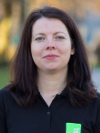
Motivated by the responses to the young chemists program at the Chemistry Days, we made it one of our main purposes for the future to expand the program, with lectures and workshops throughout the year. The concept that we constructed split the lectures into two fields and we want to further expand this: “Chemistry a_side” and “Talking Business”. In “Chemistry a_side”, experts will give presentations about everyday life phenomena and their connection to chemistry. The goal is to inspire chemists from every age group and education level.
For the business talks, we plan to invite representatives from different companies who can give information to students about job opportunities and expectations in employees, or just talk about their own professional experiences. Another focus is to offer additional training opportunities besides the usual study plan. These are composed of special training sessions and workshops held by experts from the industry and universities. Here, the students will be introduced to hard and soft skills which are in great demand in industry. Together, all these events will enable students to establish a broad and well-grounded knowledge, both in chemistry and beyond. The program should help to make it to enter the working life easier and support the quest to find a suitable job after university.
Emanuel Ehmki
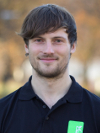
To further facilitate the start into the professional life, we see it as an important part of our work to foster the contacts and relationships of soon-to-be chemists with industrial partners. This can be achieved best, in our opinion, with a platform consisting of several pieces. The first was already mentioned before and gives the companies the opportunity to present themselves to students. The second is to bring the students to their potential future employers. This led us ultimately to the idea of excursions to companies in the immediate vicinity of cities with universities.
At these occasions, the students get to know the variety of companies around them and how different the tasks of a chemist can be. The companies, on the other hand, can have a first-hand look at their future employees and get an impression of their attitude, knowledge, and hopes. In continuation of this notion, we also like the idea of meet-and-greets, where students can socialize with representatives of industry. In today’s globalized world, companies and students alike are not restricted to a particular region anymore, and mobility has considerably increased. With support from internationally acting chemical associations, also foreign guests can be speakers or seminar facilitators.
Martin Wieser

Science does not know local boundaries. Similarly, we understand the networking aspect in particular as something that does not stop at the borders of Austria, but as a tool that enables us to reach out to Europe, maybe even the whole world. To accomplish that, we are part of and actively shaping the European Young Chemists Network (EYCN).
This organization, which has already been presented on ChemistryViews.org, connects the young sections of the European Chemical Sciences association (EuCheMS) and maintains relations with the American Chemical Society (ACS), as well as promoting programs such as Young Chemists Crossing Borders (YCCB). Through our work, we want to promote and help facilitate mobility and the exchange of ideas all over the world. One of the main goals of the EYCN also matches one of our own: Improving the image of chemistry in our society.
Stefan Felderer
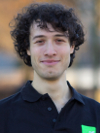
One important lever to boost this image, especially amongst young people, are international research fellowship programs. Contrarily to the needs in research and the industrial sector, too few teenagers are impressed by the fascinating phenomena beyond chemistry textbooks. A strong contribution to this effect comes from the low prestige chemistry is accredited with by the public. The Eurobarometer from 2014, a survey conducted by the European Commission, shows that people mainly spot the negative impact of research and innovation, as Dr. Untersperger, chair of the Association of the Austrian Chemical Industry (FCIO), pointed out in last year’s annual report. To change the public opinion, a fresh wind may be required.
The Jungchemiker board – with all the members of the network as support – represents today’s young, dynamic, and open-minded generation and, therefore, provides the ideal institution to tackle the problems mentioned above. Recent events which covered interactions between science and society within the community were talks at the Chemistry Days in Innsbruck and in the Jungchemiker lecture program. We plan to expand such presentations and have a number of ideas in mind on how to further strengthen the positive image of chemistry in the general public. We do not want to give everything away yet, but we are confident that our efforts will not go unnoticed.
Veronika Huber

Ultimately, after the seven of us have been working together and facing all the challenges as one team for six years, I can say: We still enjoy it! We have achieved a great deal by now. Yet, a lot remains to be done.
For the future, one of our main goals is to make the young chemists see the advantages of joining GÖCH and continuously widen and improve what the GÖCH has to offer them. So after all these years and everything we’ve achieved, our focus still remains the same: bringing people together. Because, in the end, the “Jungchemiker” are not seven students from Innsbruck, but several thousand young chemists from all over Austria.
- For more information, please see our homepage, www.jungchemiker.at, follow us on Facebook, or send us an email.
Also of Interest
- Working for the JCF – The Young Chemists’ Forum of the German Chemical Society,
Vera Koester, Michael Linden, André Augustin, Torsten John, Carmen Schrapel,
ChemistryViews.org 2015.
DOI: 10.1002/chemv.201500082 - Event Highlight: Chemistry in Austria,
Vera Koester (Photos: Matthias Glätzle © GÖCH),
ChemViews Mag. 2015. - EYCN: Ten Years Connecting Young Chemists,
Fernando Gomollón-Bel, Camille Oger, Cristina Todasca,
ChemistryViews.org 2015.
DOI: 10.1002/chemv.201500500 - Young Chemists Fearlessly Crossing Borders,
Uzma I. Zakai, Natalie LaFranzo, Christine Dunne, and Jens Breffke (American Chemical Society (ACS), Younger Chemists Committee)
ChemistryViews.org 2015.
DOI: 10.1002/chemv.201500051
